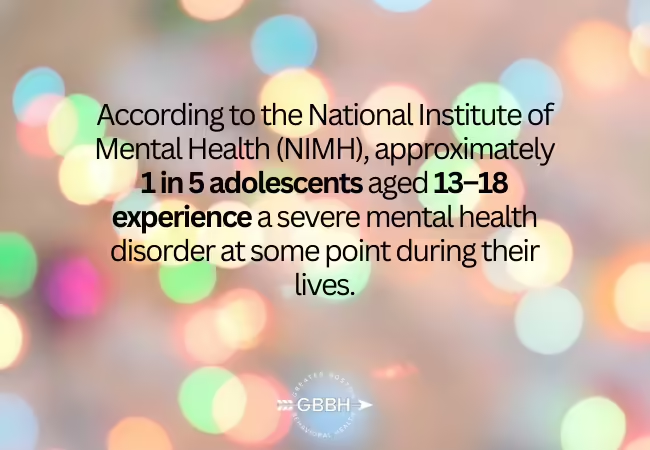Discussing mental health with your teenager can be an intimidating and often uncomfortable experience for parents, but it is a vital conversation that can significantly impact their well-being. Adolescence is a complex phase characterized by physical, emotional, and psychological growth, and teens are often at risk for developing mental health issues during this time. At Greater Boston Behavioral Health, we know that opening up the lines of communication is a critical step in supporting your teen’s mental health journey. Below, we’ll explore practical strategies for discussing mental health with your teen, recognizing the signs that they need additional support, and how professional treatment programs can play a role in their mental health care.
Understanding Teen Mental Health
Teen mental health is an essential, yet often overlooked, aspect of overall well-being. Adolescence is a time of significant physical, emotional, and psychological changes as teens navigate developmental milestones, peer relationships, academic pressures, and emerging independence. These factors can make teens particularly vulnerable to mental health challenges. Common issues include anxiety, depression, stress-related disorders, and self-esteem issues. It’s crucial for parents to understand that mental health struggles can be as serious and impactful as physical health conditions. Acknowledging the pressures teens face and normalizing open conversations about emotions can help build resilience and foster better mental health.
Building Trust and Encouragement
Creating a safe and open space for communication is fundamental in supporting your teen’s mental health. Trust is built through consistent, empathetic, and non-judgmental interactions. Start by showing genuine interest in their lives, listening actively, and avoiding criticism or quick solutions. Encouragement goes hand-in-hand with trust; remind your teen that they are valued and loved no matter what. Small gestures like spending quality time together, asking open-ended questions, and validating their feelings can help them feel seen and heard. Let them know that it’s okay to not be okay, and that they’re not alone in facing challenges.
Why Talking to Your Teen About Mental Health Is Important
Understanding and discussing mental health openly can create an environment of trust and safety for your teen. Mental health disorders are common during adolescence, with the National Institute of Mental Health (NIMH) reporting that nearly 1 in 3 adolescents aged 13-18 experience an anxiety disorder and 1 in 5 will experience a serious mental health issue. These issues can impact every aspect of their lives, including their academic performance, social relationships, and self-esteem.
Addressing mental health proactively helps normalize these experiences and encourages your teen to be open about their struggles. When teens know that mental health is just as important as physical health, they are more likely to reach out for help when needed.
Tips for Starting the Conversation
- Choose the Right Time and Place: Avoid discussing mental health during stressful moments or when your teen is busy or distracted. Select a calm, quiet environment where both you and your teen feel comfortable. It’s important that the setting allows for uninterrupted dialogue and helps them feel secure enough to share their feelings.
- Be an Active Listener: Listening is the most critical part of any conversation about mental health. Give your teen your full attention and show them that you’re genuinely interested in what they have to say. Validate their emotions by saying things like, “I understand that must be difficult for you,” or “Thank you for telling me how you feel.” Avoid interrupting or jumping to conclusions—just let them talk.
- Use Open-Ended Questions: Rather than asking yes/no questions, which can be met with one-word responses, use open-ended questions to encourage more detailed answers. For example, instead of asking, “Are you okay?”, ask, “How have you been feeling lately?” or “What’s been on your mind this week?”
- Be Honest and Relatable: Sharing your own experiences with stress, anxiety, or mental health challenges can help your teen feel more at ease. You might say something like, “I know sometimes I feel really stressed about work, and I find that talking about it helps me feel better.” This shows them that mental health is a normal part of life, and it’s okay to ask for help when they need it.
- Avoid Judgment and Stereotypes: Make sure to approach the topic with an open mind and without judgment. Avoid phrases like “It’s just in your head” or “You’ll grow out of it.” Instead, use positive language that reinforces that their feelings are valid and normal.
- Discuss Mental Health in Context: It’s beneficial to approach the topic by discussing it in terms they can relate to, such as school stress, friendships, social media, and their own identity. This helps them see that mental health is connected to their day-to-day experiences.
Strategies for Discussing Sensitive Topics
Discussing mental health with teens can be intimidating, but it’s important to approach these conversations thoughtfully. Start with casual conversations and gauge their comfort level before diving deeper into more serious topics. Be patient and avoid making them feel pressured to share more than they’re comfortable with. Use language that is age-appropriate and relatable, avoiding clinical terms that may feel impersonal. Acknowledge their experiences and emotions without minimizing them, even if their problems seem minor compared to adult challenges. It’s helpful to share stories of people they can relate to—whether friends, public figures, or fictional characters—who have faced similar struggles and sought help.
Be clear that mental health is just as important as physical health and that asking for help is a sign of strength, not weakness. If your teen seems hesitant, suggest activities that indirectly address mental health, such as mindfulness exercises, journaling, or family activities that promote relaxation and connection.
Recognizing Signs Your Teen Needs Professional Help
While it’s normal for teens to have mood swings or occasional stress, certain warning signs indicate that professional intervention may be necessary. Watch for significant changes in behavior, such as withdrawal from social activities, a sudden drop in grades, or a marked change in sleep and eating patterns. Increased irritability, persistent sadness, excessive worry, or extreme mood swings can also be red flags. Self-harm behaviors, substance abuse, or expressions of hopelessness should never be ignored.
If you notice these signs, don’t hesitate to talk to your teen and encourage them to speak with a mental health professional. Early intervention can make a substantial difference in outcomes and help them develop healthy coping mechanisms. Seek support from a Mental Health Treatment Center in Massachusetts or inquire about treatment programs that offer Cognitive-Behavioral Therapy (CBT), Dialectical Behavior Therapy (DBT), and other evidence-based therapies. At Greater Boston Behavioral Health, specialized mental health treatment programs are designed to meet the unique needs of teens and provide support in a compassionate, understanding environment.
When to Seek Professional Help
Even with the best intentions and open communication, some mental health issues are more severe and require professional support. Recognizing when your teen needs extra help can be life-changing. If you notice any of the following signs, it’s time to consult a mental health professional:
- Persistent Sadness or Irritability: A change in mood that lasts for weeks and interferes with daily activities.
- Withdrawal from Social Activities: A sudden disinterest in spending time with friends or participating in activities they used to enjoy.
- Declining Academic Performance: A sharp drop in school grades or failure to complete assignments.
- Extreme Anxiety or Panic Attacks: Excessive worry, fear, or sudden bouts of anxiety that disrupt their ability to function.
- Self-Harming Behavior or Talk of Self-Harm: Signs of self-injury or verbal expressions indicating suicidal thoughts require immediate attention.
- Changes in Appetite or Sleep Patterns: Significant changes in eating habits, sleep, or energy levels can be indicative of a deeper mental health concern.
Common Therapies for Teen Mental Health Treatment
At Greater Boston Behavioral Health, we offer a variety of Mental Health Treatment Programs tailored to meet the unique needs of teens and their families. Two common evidence-based therapies include:
- Cognitive-Behavioral Therapy (CBT): CBT is an effective treatment for addressing anxiety, depression, and other mental health issues. This therapy helps teens recognize negative thought patterns, develop healthier thinking habits, and engage in problem-solving strategies to better cope with stress.
- Dialectical Behavior Therapy (DBT): DBT is particularly helpful for teens who struggle with emotional regulation and intense emotions. It teaches skills for mindfulness, distress tolerance, emotional regulation, and interpersonal effectiveness, helping them better manage their reactions and relationships.
Intensive Outpatient Programs (IOP) and Partial Hospitalization Programs (PHP) are also available for teens who need more comprehensive support. These programs offer a structured environment where teens can engage in therapy and skill-building activities while continuing to live at home.
Why Greater Boston Behavioral Health Is Your Trusted Choice
Choosing the right treatment program for your teen can be overwhelming, but Greater Boston Behavioral Health stands out for its comprehensive approach. Our Mental Health Treatment Center in Massachusetts provides personalized care that is compassionate and evidence-based. With a team of experienced therapists and access to mental health therapy programs that include both CBT and DBT, we ensure that your teen receives the highest standard of care. Our programs are designed to help teens manage stress, develop healthy coping strategies, and improve overall mental wellness.
Conclusion
Starting a conversation about mental health with your teen can be challenging, but it is a necessary step in promoting emotional well-being and resilience. By maintaining an open and empathetic dialogue, you’re encouraging your teen to prioritize their mental health and seek help when needed. If you’re concerned about your teen’s mental health or need more support, Greater Boston Behavioral Health is here to guide you through every step of the journey. Our dedicated team is committed to helping teens and families navigate the complexities of mental health with compassionate, evidence-based treatment.
FAQs on How to Talk to Your Teen About Mental Health
Why is it important to talk to my teen about mental health?
Open discussions about mental health help teens feel seen and heard, reduce stigma, and encourage them to seek help when needed. It promotes emotional resilience and healthy coping strategies.
What are some signs that my teen may need professional help?
Warning signs include withdrawal from social activities, sudden changes in behavior, poor academic performance, changes in sleep and eating habits, extreme mood swings, or any self-harm or substance use.
How can I start a conversation about mental health with my teen?
Begin by showing interest in their day-to-day life, asking open-ended questions, and listening without judgment. Use relatable stories or examples to make them feel more comfortable discussing sensitive topics.
What type of professional support can teens receive?
Teens can benefit from various mental health treatment options, including Cognitive-Behavioral Therapy (CBT), Dialectical Behavior Therapy (DBT), and other specialized programs. Greater Boston Behavioral Health offers treatment tailored to the needs of adolescents.
How can I support my teen if they show signs of struggling?
Show empathy, validate their feelings, and remind them that they are not alone. Encourage open communication and help them explore professional treatment programs when necessary.


